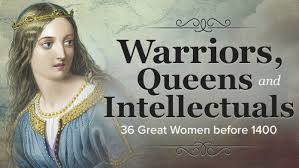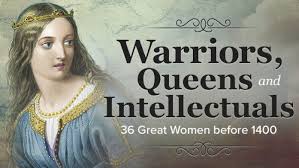TGC – Warriors, Queens, and Intellectuals: 36 Great Women before 1400
$335.00 Original price was: $335.00.$58.90Current price is: $58.90.
Ambition. While Victorian-era artists and poets immortalized the death of John the Baptist as the cold-hearted request of the teenaged Salome, it was in fact her ambitious mother Herodias who requested the preacher’s head. Her unending hunger for status and wealth eventually led to exile File Size: 10.96 GB Format File: (mp4)
TGC – Warriors, Queens, and Intellectuals: 36 Great Women before 1400
Throughout history, women have played integral roles in family, society, religion, government, war—in short, in all aspects of human civilization. Powerful women have shaped laws, led rebellions, and played key roles in dynastic struggles. Some were caught up in forces beyond their control, while others manipulated and murdered their way to the top. However, unearthing their stories from the historical record has been a challenge, with the ordinary difficulties of preserving information across the generations increased by centuries of historical bias and gendered expectations. Women, when they were mentioned at all, often filled the role of virtuous maiden, self-effacing mother, or seductive villain. Imagine what you are missing when only half the story is being told.
In Warriors, Queens, and Intellectuals: 36 Great Women before 1400, taught by Professor Emerita of Humanistic Studies Joyce E. Salisbury, you will experience another side of history, one that has often been overlooked. In these 36 lectures, women step out from the footnotes and sidebars of traditional history and into the spotlight, illuminating the dark corners of the pre-modern world along the way. From thwarted daughters and ambitious wives to fearless revolutionaries and brilliant philosophers, you will see how women have played diverse roles throughout history and why their influence is so vital to a fuller understanding of the world we live in today. Beginning at the start of the Roman Empire and carrying you through to the end of the Middle Ages, Professor Salisbury will introduce you to dozens of influential women from all across the globe.
As you will see, there are many ways to wield power. Some women worked within the rules and expectations that bound them, using their unique influence as wives and mothers to shape politics, religion, and more. Meanwhile, others defied restrictions imposed on them, occupying places of leadership and power that changed the world. With this course, you will get the unique opportunity to explore their contributions to our history, and see major turning points and ideas through new perspectives.
Get immediately download TGC – Warriors, Queens, and Intellectuals: 36 Great Women before 1400
Rebels and Rulers
From Rome and China to Persia and Byzantium, the world before 1400 saw the foundation and expansion of immense imperial powers. These powers were often hierarchical and rigidly patriarchal, and their presence imposed new systems of religion, tradition, and governance that forever altered the places they touched, often to the detriment of women who had held a certain level of power and respect within tribal communities before their arrival.
Striving to survive under these new conditions, some women took on the mantle of warrior and revolutionary, fighting for the good of their people in times of crisis. Their rebellions often failed in the face of insurmountable odds, yet their power as symbols of freedom (and cautionary tales) has lived on. In the case of the Trung sisters of Vietnam, their unsuccessful attempt to wrest their homeland from the hands of imperial invaders made them symbols of patriotism and resistance that survive in Vietnamese culture to this very day. Another famous rebel leader, the Celtic warrior queen, Boudicca, also ultimately failed in her attempt to defeat Rome. Her legend lives on, however, thanks to a revival led by one of the most powerful female leaders of the modern era, Queen Victoria.
There were those who fought against imperial powers, and then there were those who wielded power within those sprawling empires. Though few have heard her name, some modern scholars believe Sorkhakhtani was one of the most influential women in history, wielding immense authority in the Mongol empire at the height of its power. Plotina, Julia Maesa, Pulcheria, Wu Zetian, and Razia are just a few of the women you will encounter from all over the globe who achieved power, either through their own rule or that of their families. Some were benevolent and some were ruthless—often many of them were both—but they all left a mark on the world.
Get immediately download TGC – Warriors, Queens, and Intellectuals: 36 Great Women before 1400
Saints and Sinners
Everyone loves a hero, but history is not painted in stark contrasts of black and white—and neither are the women whose stories you will uncover. As Professor Salisbury demonstrates, for every Vibia Perpetua or Joan of Arc who was martyred for a cause greater than themselves, there are many others who could certainly be considered selfish, amoral, or even villainous. (And many who were painted as weak or nefarious by historians with their own agendas.) This is one of the many important reasons historians work so hard to uncover the stories of overlooked and forgotten women: to reveal their many complex dimensions as people who were important to history, for both good and ill.
While many women throughout history were driven to act by a desire to protect themselves or their families, or to achieve greater freedom and control over their own lives, others had less laudable—but no less human—desires, such as:
- Ambition. While Victorian-era artists and poets immortalized the death of John the Baptist as the cold-hearted request of the teenaged Salome, it was in fact her ambitious mother Herodias who requested the preacher’s head. Her unending hunger for status and wealth eventually led to exile—and dragged her daughter’s name through the historical mud in the process.
- Power. In the quest for power, women have often proved themselves to be as ruthless as men. Some sources suggest that Zenobia, the queen of Palmyra, had her husband and step-son assassinated so she could rule as regent for her young son. Though she is remembered as a dynamic leader in the struggle against Roman rule and a mighty would-be empress, her path was fraught with moral compromise.
- Vengeance. Freydis, the sister of Leif Eriksson, was a formidable Viking woman with a nasty temper. When she felt her claim to her brother’s property in the New World was under threat, she wasn’t afraid to manipulate those around her—and commit a few murders—to avenge an insult and protect what she believed was rightfully hers.
And some women gained fame not because they chose to rebel or seek great fortune, but because they were lucky—or unlucky—enough to be caught in the right place at the right time. Whether swept up in a tide of religious persecution or kidnapped by an invading army, you will meet many women who found ways to make their own mark on history and turn misfortune to their advantage.
Belles Lettres
Power isn’t always about wealth and political clout. Sometimes, it can come from something as simple as the ability to read and write. For centuries of human history, women were often denied access to literacy and education. Since most would live out their lives as the keepers of hearth and home, education for women was often considered unnecessary—or even morally dangerous. Despite these fears and the limitations they imposed, we know that some women were able to pursue knowledge and deeply influence fields such as:
- Religion: The writings of Christian martyr Perpetua became so influential after her death that church leaders warned others not to treat them as scripture.
- History: Byzantine princess Anna Comnena is credited with writing one of history’s greatest chronicles of the First Crusade.
- Mathematics: Lubna of Córdoba was an astonishing mathematician who became an intellectual leader in a time and place where women were rarely accepted as public figures.
- Literature: Lady Murasaki of Japan wrote what is now considered to be the first prose novel, hundreds of years before the novel would become a definitive literary form in Europe.
- Philosophy: Perhaps best remembered for her love affair with Abelard, Heloise made her own mark on the world through her writings on philosophy and religion.
- Medicine: The German Benedictine abbess Hildegard revolutionized the medical field with her writings that blended the science of the day with more traditionally feminine knowledge of herbs and food.
The contributions of women to intellectual fields like literature and science, as well as the power they wielded through religion, rebellions, and dynasties, have been invaluable. But even those who left only personal writings like diaries and letters, or whose stories became footnotes in larger struggles, have given us astonishing resources to understand the world they lived in and how history is made every day. With her great passion for these stories and their importance in our collective history, Professor Salisbury will show you contributions great and small, ordinary and astonishing. You will see how many of these women never intended to do more than live their lives in peaceful obscurity, while others wanted to—and often did—change the world.
In unearthing these stories, we are not only able to rediscover the contributions of women— often lost to time and whose stories were written to fit prevailing prejudices—but we are also able to see our own history in new, more nuanced ways. Beyond battles and dates and the names of great men, there are other stories that can give us a richer understanding of the past and how it has shaped the world we live in today.
Read more: https://archive.li/NB7hQ
Course Features
-
Lectures
0 -
Quizzes
0 -
Duration
50 hours -
Skill level
All levels -
Language
English -
Students
400 -
Assessments
Yes
Be the first to review “TGC – Warriors, Queens, and Intellectuals: 36 Great Women before 1400” Cancel reply
Related products
Personal Development
Personal Development
Tara Stiles – Your Daily Yoga Practice with Tara – 30 Minutes – 2018
Personal Development
Personal Development
Personal Development
Personal Development
Personal Development
Dr. med. Dietrich Klinghardt – Healing the Brain. Seminarmittschnitt Mai 2009
Personal Development













Reviews
There are no reviews yet.